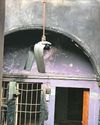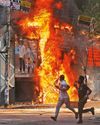
The question of humanitarian justice for the victims of the Sri Lankan civil war is one such unattended wound that lies deep under the skin of the island country. Recently, Sri Lankan Public Security Minister Ananda Wijepala prohibited commemorative public events for the deceased members of the Liberation Tigers of Tamil Elam (LTTE). Subsequently, three people were arrested on November 30 under the Prevention of Terrorism Act. Given that the LTTE remains a banned organisation, it is no surprise that commemorative events for LTTE members using the LTTE logo would be considered a legal offence. What remains problematic, however, is the lack of effort on the part of the government to reconcile the agonies of the war victims.
The 26-year-long civil war between the Sri Lankan government and the LTTE officially ended in May 2009 after claiming around 70,000 lives and displacing four times as many. Both sides committed a variety of war crimes. As the war ended, the entire LTTE leadership, along with scores of soldiers, were executed as punishment for their offences, but the government forces were never held accountable for the rape, torture and extrajudicial killings they committed. Instead, successive governments shielded the war criminals, promoted them sometimes, and tactfully suppressed investigations of war crimes. The victims demanding justice were silenced with the aid of anti-terrorism laws. The Tamil community and the Tamil-dominated former conflict zones were continually marginalised. While the economic cost of the civil war is much discussed, its hefty humanitarian cost remains largely unaccounted for. This intentional lack of reconciliation left a never-closing wound in the country's socio-cultural psyche.
This story is from the January 21, 2025 edition of Outlook.
Start your 7-day Magzter GOLD free trial to access thousands of curated premium stories, and 9,000+ magazines and newspapers.
Already a subscriber ? Sign In
This story is from the January 21, 2025 edition of Outlook.
Start your 7-day Magzter GOLD free trial to access thousands of curated premium stories, and 9,000+ magazines and newspapers.
Already a subscriber? Sign In

Nomadland
All eyes are on President-elect Donald Trump and his policy on immigration

Far from Home
We have forgotten the plight of Afghans who fled to India, and continue to suffer

Bang Bang That Awful Sound
What happens when we listen closely to the soundscape of war?

Refugee Dilemma
For most Indian-origin Sri Lankan Tamils, who are victims of ethnic conflict and civil war, proving that they are not illegal migrants is a nearly impossible task

They Poured Fire on Us
The resilience of refugee women from Sudan, Ethiopia and Yemen in the face of war and displacement is remarkable

The Sound and the Fury
Iraqi poet, novelist, translator and scholar Sinan Antoon was born and raised in Baghdad.

The Day I Became a Woman
In a country where authorities have been directly engaging in the gruesome war against women for decades, artists like Nahid Hassanzadeh stand apart as a voice of dissent–a haunting reminder of the unwavering spirit of the rebellious Iranian women fighting against the Islamic Republic’s violent crackdown.

The Kite Runner
The official figure of civilian deaths in Afghanistan is a serious underestimate. It is unlikely that we will ever know the real cost of Afghan lives

American Patriot
Barring a few exceptions, Hollywood movies continue to be gung-ho about the United States' penchant for waging wars across the globe

The Hunters
How can Bangladesh's fractured society, burdened by layers of trauma, begin to heal?
